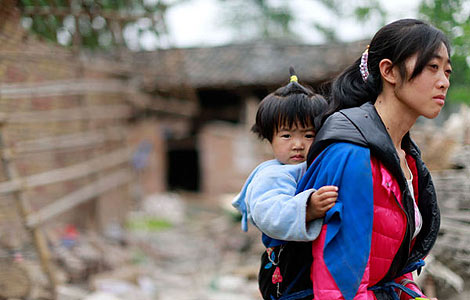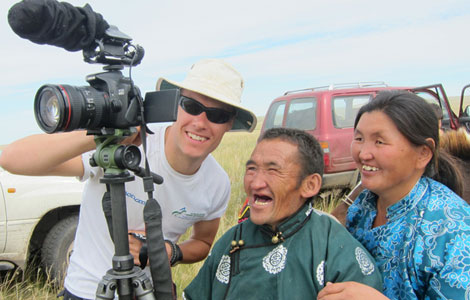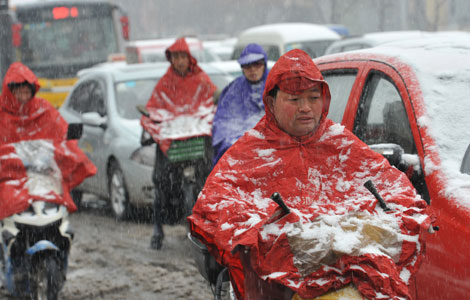Ensuring water supply, preventing disease are urgent issues
Updated: 2013-04-22 07:22
By An Baijie in Lushan, Sichuan, and Xu Wei in Beijing (China Daily)
|
||||||||
The prevention of endemic diseases and ensuring food and water supply have become urgent issues for the people living in the quake-affected streets and villages in Lushan county, Sichuan province, as search and rescue efforts continued on Sunday.
Temperatures higher than 20 C in Lushan and rainy weather could create conditions for endemic diseases, and prevention has become an urgent issue soldiers involved in the rescue efforts, said Li Shiming, commander of the Chengdu Military Area Command.
On Sunday, Li was coordinating a group of more than 10,000 soldiers and militia reserve troops from the area command in Lushan's Longmen township, the epicenter of the magnitude-7 earthquake.
"The top priority remains the search and rescue of survivors. But we will shift part of our staff to disinfection efforts in quake-affected areas as the risk of endemic diseases should not be underestimated," he said.
The search and rescue work has covered all of the rural areas in Lushan county and is expanding to nearby Baoxing county, according to Liu Jingbo, deputy chief of staff of the armed police in Sichuan province.
"We are not expecting a sharp rise in the number of casualties as the search and rescue has covered most areas," he said.
Another task for workers is tearing down houses that were damaged in the earthquake.
"Even houses that seemed sound have become hazardous. They are in fact standing debris and must be torn down to rebuild," Li said.
Drainage could also become an issue as most tents were pitched on flat ground, and weather forecasters predict rain over the next few days.
Meanwhile, traffic congestion in the quake-hit areas has caused shortages of food, water and tents, especially in rural areas.
Vehicles swarmed into Lushan after the magnitude-7 earthquake struck on Saturday. Most roads and streets in the county only have two lanes, and the provincial traffic management authorities in Sichuan were forced to ban vehicles that were not related to the rescue work from going into the epicenter area.
"So far traffic congestion has posed the largest difficulty for rescue workers," Liu said.
In Qinglongchang village in Longmen township, each household was given a ration of two bottles of water per day and instant noodles were reserved for children and the elderly.
Wu Yanghua, a 36-year-old resident of the village, said he had not consumed any of the food or water because the limited supplies were needed for the children in his home.
The tents that have been pitched in the village since the earthquake are also overcrowded. In one case, 58 villagers were sharing a single tent.
"I hope they can solve the problem of food and water supply as soon as possible," Wu said.
As of Sunday afternoon, more than 1,445 aftershocks had been recorded in Lushan since the magnitude-7 earthquake struck the county on Saturday morning, with three aftershocks registering from 5 to 5.9 magnitude and 17 aftershocks at 4 to 4.9 magnitude, according to a media briefing by the county government.
The earthquake and aftershocks have killed 119 residents in the county and severely injured 6,115 residents. It also resulted in a total economic loss of 29.41 billion yuan ($4.76 billion), according to the county government.
A total of 27,924 houses were destroyed in the earthquake, and 110,000 residents are facing water shortages, the county government said.
Contact the writers at anbaijie@chinadaily.com.cn and xuwei@chinadaily.com.cn
(China Daily 04/22/2013 page2)

 Obama celebrates young inventors at science fair
Obama celebrates young inventors at science fair
 Earth Day marked around the world
Earth Day marked around the world
 Volunteer team helping students find sense of normalcy
Volunteer team helping students find sense of normalcy
 Ethnic groups quick to join rescue efforts
Ethnic groups quick to join rescue efforts
 Earthquake leaves family shattered
Earthquake leaves family shattered
 Boston Marathon bombing suspect charged
Boston Marathon bombing suspect charged
 Chasing vestiges of the Great Wall
Chasing vestiges of the Great Wall
 Weekly Photos: April 15-21
Weekly Photos: April 15-21
Most Viewed
Editor's Picks

|

|

|

|

|

|
Today's Top News
Russia criticizes US reports on human rights
China 'aims to share its dream with world'
Chinese president appoints 5 new ambassadors
Nation's IPR suits see spike in 2012
H7N9 not spread between humans: WHO
Health new priority for quake zone
Sino-US shared interests emphasized
China, ROK criticize visits to shrine
US Weekly

|

|






